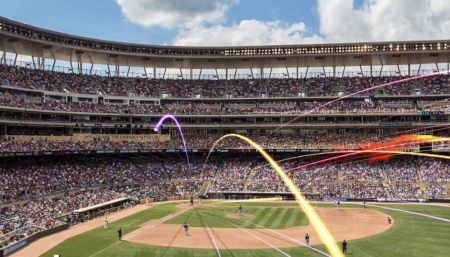The sporting world, much like every industry has been rocked to its core by Covid-19, and as initial steps are beginning to take place to ease lockdown and get sporting events back underway, many are trying to figure out how to make stadia safe and usable now, but also what the ‘new normal’ might look like.
As the English Premier League looks to a netural stadium approach to contain the spread of the virus, fans congregating and the match day pressures on the local police force, it raises the question as to how many of these selected ‘netural’ stadia are equipped to handle the pressures of multiple games per day as well as ensuring that the premises are clean and social distancing remains in place.
The stadium sector has never been shy of technology, from state-of-the-art television recording rigs to sensors that monitor the length of the grass on a pitch, but Covid-19 requires very particular demands on a stadium and in many cases, demands most currently aren’t set up to handle.
With technology playing such a key part in sport today, why have so many stadiums failed to digitize their day-to-day operations? As a result of this, stadia frontline workers are now facing an uphill battle when fixtures resume as they look to tackle tasks with limited, if any technology.
Digitizing operations is one of the most straight-forward ways to transform the way in which a stadium runs, improve workforce collaboration at a time when social distancing is key, and prove to sports teams and the public that the venue is putting safety first.
So, as the Premier League looks to restart, below are the key areas stadia should be looking at to ensure players, backroom staff and stadium staff are kept safe.
Smart sanitation
Hygiene is going to be front of mind. Using simple technology such as NFC sensors at key locations paired with a monitoring app allows venue managers to flag specific cleaning tasks for workers in the vicinity. With sensors it is possible to demonstrate proof of presence of cleaning staff, giving a clear audit trail on all hygiene procedures. Using smart tech, enables frontline workforce to tackle cleaning operations by providing them with detailed checklists and guides on a device they carry in their pockets.
Digitizing social distancing
Even as selected stadiums are given the green light to reopen, it is likely that they will be complying with dramatically reduced numbers of staff allowed in the premise. Technology can play a key role in adhering to social distancing guidelines, for both the public and staff. Technology such as a LoRaWAN sensor can effectively people-count by processing signals it receives in its field of view. By monitoring how many Bluetooth/Wi-Fi signals are in a given area, the sensor maps out where people are located, and can alert venue managers if areas become congested allowing them to take action.
Heatmapping hot spots
Smart stadium technology provides the control room with a digital map of a venue. Using sensors to zone areas of the stadium, allows managers to manage the venue ‘hot spots’ that have the potential for congestion like changing rooms, tunnels, pitches and dugouts. Using maps, staff can be assigned to monitor their zones and tasks at specific NFC sensors can be scheduled and staggered to prevent congestion. Keeping the public safe and physically distant can be a challenge, but simple door sensors can notify the control room if a specific door has been frequently opened during a short period of time, allowing venue operators to send a member of staff to break up any overcrowding.
Operational timelines
Digitizing an entire venue can seem like an overwhelming task, particularly at a time when resources are already stretched, however setting up a digital operational solution can be done in days rather than months. Using the most basic of sensors, an NFC tag placed in various locations around a venue, eliminates paper-based processes and completely digitizes frontline operations. Placing a sensor and programming only takes a short amount of time but has a lasting positive impact on day-to-day operations for years to come.
When we think of the impact of Covid-19 it’s hard to look at anything but the negatives, however, it has presented the world with an opportunity to change. Every sector has been hit by this crisis, particularly the stadium sector. Rather than retreating into the new ‘normal’ we can instead challenge ourselves to embrace the ‘new beginning’ and digitize operations to provide the public and workers with a safe, clean environment to enjoy the sporting experience, while empowering and enabling frontline workers with the technology they need to efficiently and safely do their jobs.
Article written by Mike Elliott, founder of Over-C





